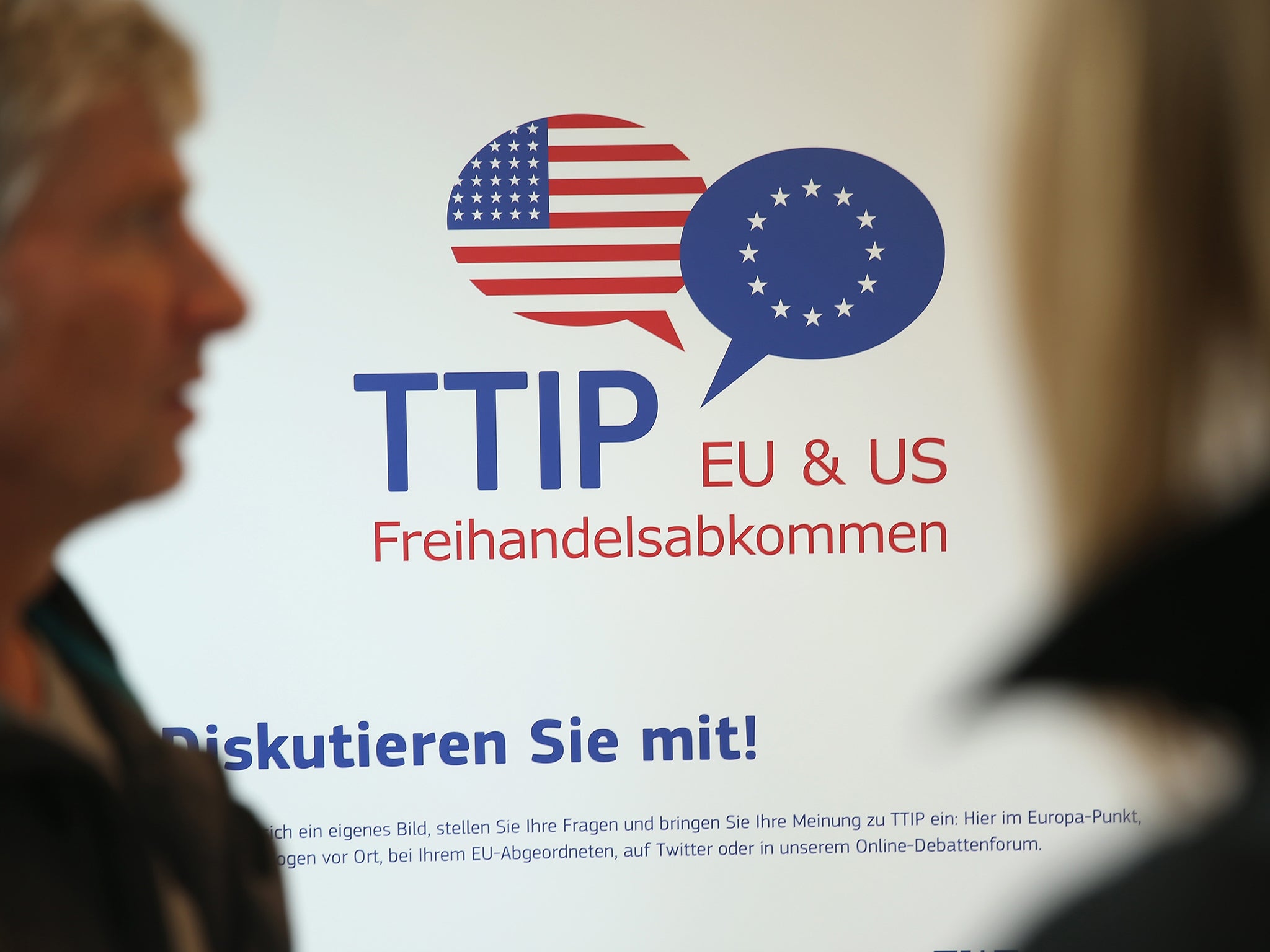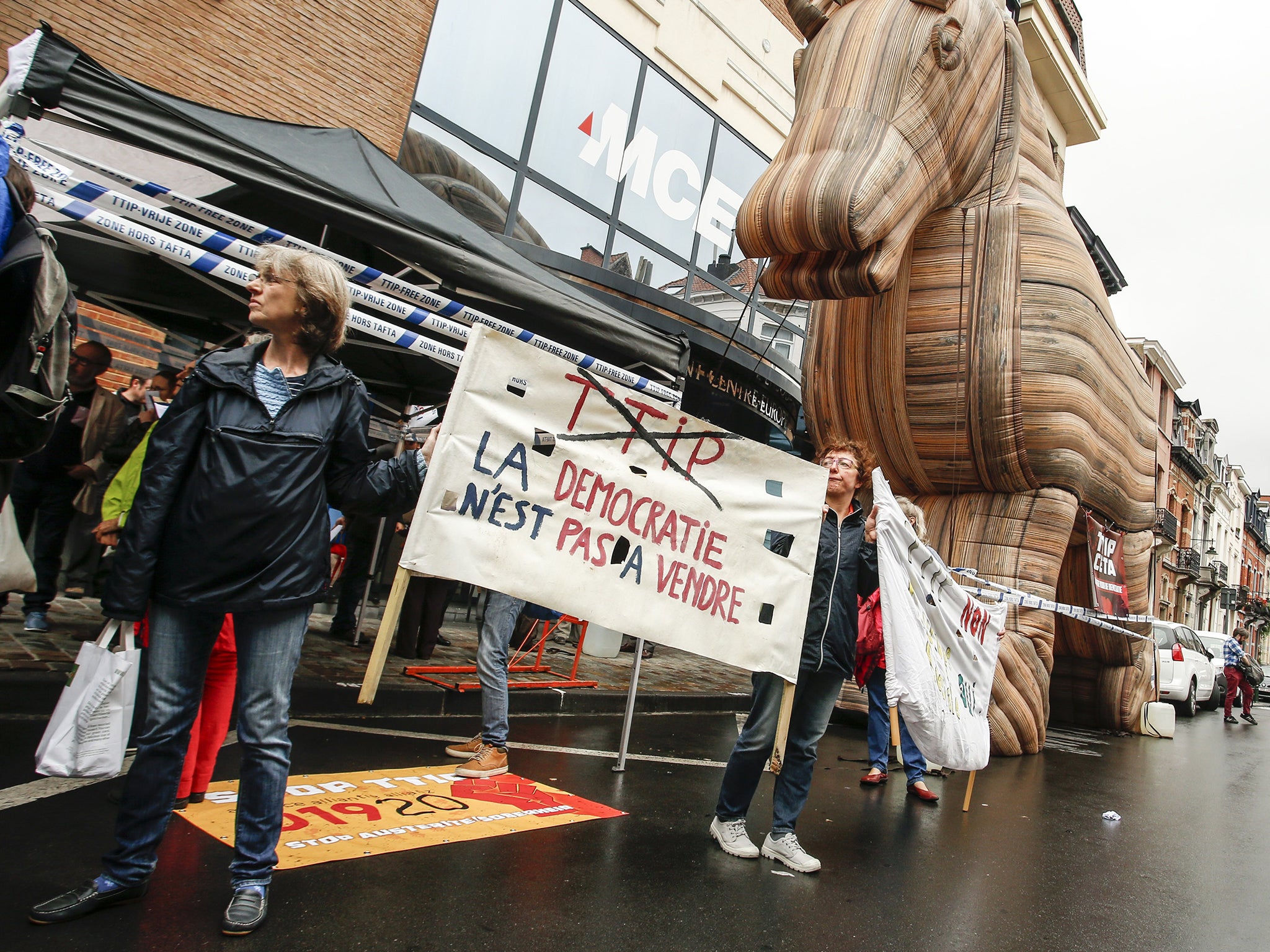TTIP deal: Business lobbyists dominate talks at expense of trade unions and NGOs
The proposed free trade treaty could become the biggest such deal ever made

Your support helps us to tell the story
From reproductive rights to climate change to Big Tech, The Independent is on the ground when the story is developing. Whether it's investigating the financials of Elon Musk's pro-Trump PAC or producing our latest documentary, 'The A Word', which shines a light on the American women fighting for reproductive rights, we know how important it is to parse out the facts from the messaging.
At such a critical moment in US history, we need reporters on the ground. Your donation allows us to keep sending journalists to speak to both sides of the story.
The Independent is trusted by Americans across the entire political spectrum. And unlike many other quality news outlets, we choose not to lock Americans out of our reporting and analysis with paywalls. We believe quality journalism should be available to everyone, paid for by those who can afford it.
Your support makes all the difference.European Commission officials have held hundreds of meetings with lobbyists to discuss the proposed Transatlantic Trade and Investment Partnership (TTIP) treaty - yet only around one in ten is with public interest groups.
The world’s biggest companies in finance, technology, pharma, tobacco and telecoms are dominating discussions with the EU executive body’s trade department responsible for the proposed EU-US free trade treaty, which could become the biggest such deal ever made.
Between January 2012 and February 2014, as TTIP discussions began, the Commission’s trade department (DG Trade) had 597 behind-closed-door meetings with lobbyists to discuss the negotiations, according to internal Commission files obtained by research group Corporate Europe Observatory (CEO).
There were 528 meetings (88 per cent) with business lobbyists while only 53 (9 per cent) were with groups such as trade unions and NGOs. The remainder were with other parties such as public institutions and academics.

European Trade Commissioner Cecilia Malmström took office in November last year promising a “fresh start” for the TTIP negotiations. More civil society involvement and listening to public concerns was her “top priority”, she said. Yet in her first six months in office Ms Malmström, her Cabinet and the Director General of DG Trade had 121 one-on-one private lobby meetings in which TTIP was discussed.
CEO said 100 of these declared meetings (83 per cent) were with business lobbyists – but only 20 (17 per cent) were held with public interest groups. The other meeting was with a standard setting institution. Although the EU has a transparency register for lobbyists it is only voluntary and CEO revealed that one in five corporate groups lobbying DG Trade on TTIP are not on it.
Politicians have joined campaigners in calling for greater transparency in the Commission’s TTIP negotiations after The Independent published the heavily redacted correspondence between ‘Big Tobacco’ companies British American Tobacco (BAT) and Philip Morris obtained by CEO.
Green MEP Molly Scott Cato said: “The censoring that the Commission has undertaken regarding its discussions with big tobacco reaffirms the secrecy surrounding these negotiations and is symbolic of the way MEPs, the European Parliament and European citizens are being treated.
“Looking through the smoke haze we can see why these documents appear blacked out. Nine out of ten lobby contacts during the preparatory phase of the TTIP negotiations were with companies and corporate lobby groups. Corporations are effectively co-writing the treaty. Yet the vast majority of citizens are against TTIP.
“A worrying aspect of this particular cover-up is that tobacco control policies are vital for public health. We know that Big Tobacco have used comparable trade treaties to take legal action against Australia and Uruguay as those nation have attempted to take action in the interests of public health.”
BAT, the world’s second largest tobacco group with brands in 180 countries, spends between 1.5m and 1.75m euros a year employing seven lobbyists in the EU. Philip Morris spends between 1.25m and 1.5m on employing six lobbyists, although not all working full-time on EU-related activities.
Yet even that spend is dwarfed by companies such as European Federation of Pharmaceutical Industries and Associations and ExxonMobil Petroleum and Chemical spend even more on lobbying – 5m euros each annually, according to the register.
By contrast the European Network for Smoking and Tobacco Prevention NGO spends less than 10,000 euros a year employing two lobbyists in Brussels in a part-time basis. It survives with the help of a 200,000 euros grant from the EU.
Politicians are only allowed to read documents relating to TTIP in a secure European Parliament restricted reading room. They are also required to sign a 14-page document ultimately promising not to share the information with their constituents.
Ms Scott Cato described the experience earlier this year comparing it to “a scene from a James Bond film”.
She said: “I don’t feel what I was granted access to contained the important details. Key information seems to have been retracted; there was little of interest. But what I did see did not leave me with any sense of reassurance, either that the process of negotiating this trade deal is democratic, or that the negotiators are operating on behalf of citizens. It reconfirmed that this is a corporate discussion, not a democratic one.”
Join our commenting forum
Join thought-provoking conversations, follow other Independent readers and see their replies
Comments